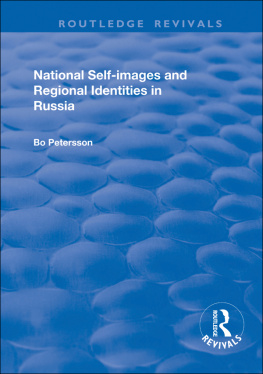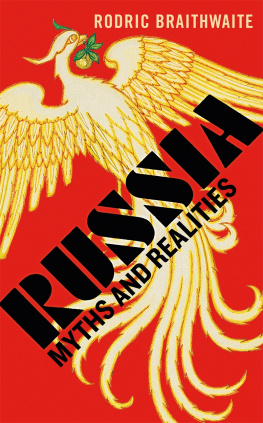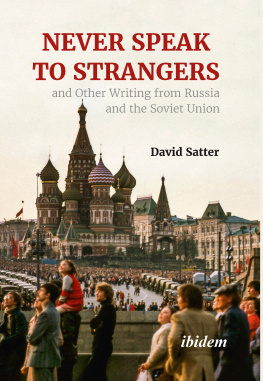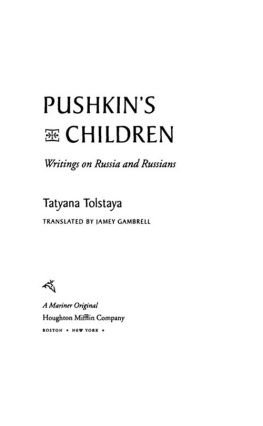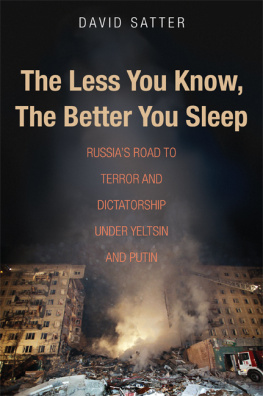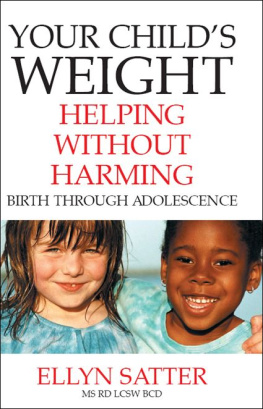Darkness at Dawn
Darkness at Dawn
The Rise of the Russian Criminal State
DAVID SATTER

Published with assistance from the Louis Stern Memorial Fund. Copyright 2003 by David Satter. All rights reserved. This book may not be reproduced, in whole or in part, including illustrations, in any form (beyond that copying permitted by Sections 107 and 108 of the U.S. Copyright Law and except by reviewers for the public press), without written permission from the publishers.
Printed in the United States of America by R. R. Donnelley & Sons.
Library of Congress Cataloging-in-Publication Data Satter, David, 1947
Darkness at dawn : the rise of the Russian criminal state / David Satter.
p. cm.
Includes bibliographical references and index.
ISBN 0-300-09892-8 (alk. paper)
1. Organized crimeRussia (Federation) 2. Russia (Federation)Social conditions1991 I. Title.
HV6453.R8 S27 2003
364.1060947dc21 2002015754
A catalogue record for this book is available from the British Library.
The paper in this book meets the guidelines for permanence and durability of the Committee on Production Guidelines for Book Longevity of the Council on Library Resources.
10 9 8 7 6 5 4 3 2 1
To the honest people of Russia
For nothing is hidden except to be known and nothing is secret except to be revealed.
Mark 4:22
Contents
Illustrations follow
Preface
In Darkness at Dawn, I have tried to describe the rise of a business criminal elite and its takeover of the machinery of the Russian state, leading to the impoverishment and demoralization of the great majority of the population.
The book consists of narrative histories and personal stories. The histories show how criminal oligarchic power achieved its present dominance in Russia, while the stories of ordinary Russians provide a social context for the activities of this elite. I have chosen to describe Russia with the help of stories because Russians experienced a spiritual crisis in the reform period as a result of being confronted with a new way of life for which their previous experience had not prepared them. To understand this spiritual crisis, facts alone are not sufficient. It is necessary to grasp the psychology of Russia, and this can be conveyed only through the stories of individual lives.
It is also not irrelevant that telling the stories of ordinary Russians is a way to help them. As the Danish novelist Isak Dinesen put it, All sorrows can be borne if you put them into a story or tell a story about them.
Abbreviations and Administrative Delineations
CIS | Commonwealth of Independent States |
FAPSI | Federal Agency for Government Communications and Information (formerly part of the KGB) |
FSB | Federal Security Service |
FSK | Federal Counterintelligence Service (predecessor of FSB) |
GKI | State Property Committee |
GRU | Main Intelligence Administration (military intelligence) |
IMF | International Monetary Fund |
KGB | Committee for State Security |
MVD | Ministry of Internal Affairs |
UVD | Directorate of Internal Affairs (subdivision of the ministry) |
GUVD | Chief Directorate of Internal Affairs (principal subdivision of the ministry) |
OMON | special police detachments of the Interior Ministry |
RUBOP | (formerly RUOP) Regional Directorate for the Struggle with Organized Crime |
SBP | Presidential Security Service |
Krai Best translated as province or territory, a krai is a territorial subdivision that generally encompasses a large area, such as Primoriye in the Far East or the Krasnoyarsk region in Siberia.
Oblast Often similar in size to an American state, an oblast has the same weight in the Russian administrative system as a krai.
Raion A raion is a subdivision of a krai, oblast, or city and is responsible for most local administration, including the police and the courts.
Okrug An okrug is an administrative subdivision of Moscow, created in the mid-1990s through the consolidation of groups of raions. It can also signify a Russian military district, for example, the North Caucasus military okrug.
Any call to personal discipline irritates Russians. Spiritual
work on the formation of his personality does not present
itself to the Russian as either necessary or interesting.
Nikolai Berdyaev, Sudba Rossii (Russias Fate)
Introduction
In 1991 Russia experienced a new dawn of freedom. The Communist party was dissolved, and Russia appeared ready to build a democratic future. The literary critic Yuri Karyakin spoke for many when he said, For the first time in this century, God has smiled on Russia.
Few at that time could have foreseen the outlines of what exists today. In the years that followed, many former Communist countries experienced a rebirth of freedom, but Russia came to be dominated by poverty, intimidation, and crime. The reason is that during the reform period, which witnessed a massive effort to remake Russian society and the Russian economy, Russia once again fell victim to a false idea.
The victory over communism was a moral victory. Millions took to the streets not because of shortages but in protest over communisms attempt to falsify history and change human nature. As a new state began to be built, however, all attention shifted to the creation of capitalism and, in particular, to the formation of a group of wealthy private owners whose control over the means of production, it was assumed, would lead automatically to a free-market economy and a law-based democracy. This approach, dubious under the best of conditions, proved disastrous in the case of Russia because, in a country with a need for moral values after more than seven decades of spiritual degradation under communism, the introduction of capitalism came to be seen as an end in itself.
The young reformers were in a hurry to build capitalism, and they pressed ahead in a manner that paid little attention to anything except the transformation of economic structures. The calculation was sober, said
The decision to transform the economy of a huge country without the benefit of the rule of law led not to a free-market democracy but to a kleptocracy that had several dangerous economic and psychological features.
In the first place, the new system was characterized by bribery. All resources were initially in the hands of the state, so businessmen competed to buy critical government officials. The winners were in a position to buy the cooperation of more officials, with the result that the practice of giving bribes grew up with the system.
Besides bribery, the new system was marked by institutionalized violence. Gangsters were treated as normal economic actors, a practice that tacitly legitimated their criminal activities. At the same time, they became the partners of businessmen who used them as guards, enforcers, and debt collectors.
The new system was also characterized by pillage. Money obtained as a result of criminal activities was illegally exported to avoid the possibility of its being confiscated at some point in the future. This outflow deprived Russia of billions of dollars that were needed for its development.
Next page


